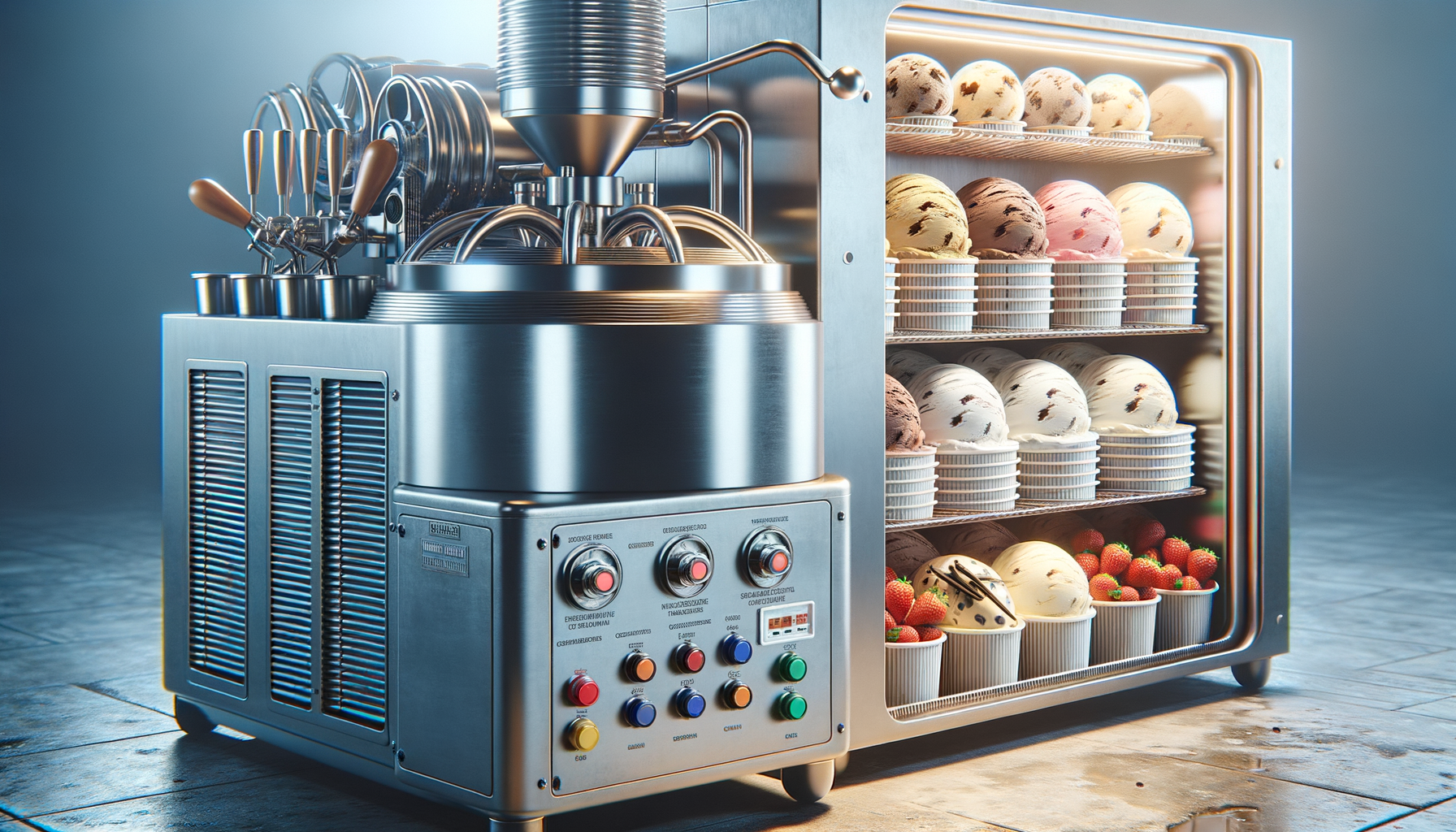The Role of Industrial Ice Cream Machines in Modern Production
Industrial ice cream machines are pivotal in the large-scale production of ice cream, ensuring that the product meets both quality and quantity demands. These machines are designed to produce ice cream with consistent texture and flavor, a feat achieved through precise temperature control and mixing techniques. They must balance efficiency with the quality of the final product, which is crucial in meeting the high demand in the industry.
One of the main advantages of industrial ice cream machines is their ability to produce large quantities of ice cream without sacrificing quality. This is achieved by maintaining a consistent freezing process, which prevents the formation of large ice crystals that can affect the texture. Moreover, these machines often come equipped with advanced features that allow for the incorporation of various ingredients, ensuring a diverse range of flavors and types.
Industrial machines also offer the flexibility to produce different types of ice cream, from traditional flavors to innovative and seasonal varieties. This adaptability is essential for businesses looking to cater to changing consumer preferences and market trends. By using quality ingredients and precise production methods, these machines help manufacturers maintain a competitive edge in the market.
Quality Ingredients: The Foundation of Exceptional Ice Cream
The quality of ingredients used in ice cream production significantly impacts the final product. Industrial ice cream machines are designed to work with a variety of ingredients, allowing manufacturers to create products that stand out in terms of taste and texture. High-quality dairy, natural flavorings, and real fruit purees are among the ingredients that contribute to the exceptional quality of the ice cream produced.
Using quality ingredients not only enhances flavor but also ensures a smoother texture. For instance, using fresh cream and milk results in a richer and creamier ice cream, while natural sweeteners and flavorings provide a more authentic taste. These ingredients are carefully measured and mixed by the machines to maintain consistency across batches.
Additionally, the use of quality ingredients aligns with the growing consumer demand for natural and healthier options. As more consumers become conscious of what they consume, the ability to produce ice cream with minimal artificial additives becomes a significant selling point. By focusing on quality ingredients, manufacturers can cater to this trend and build a loyal customer base.
Efficiency and Precision: Key Features of Modern Machines
Modern industrial ice cream machines are equipped with features that enhance both efficiency and precision in the production process. These machines are designed to handle large volumes while maintaining the delicate balance of ingredients necessary for premium ice cream. Advanced temperature control systems are a hallmark of these machines, ensuring that the ice cream is frozen quickly and evenly to prevent the formation of ice crystals.
Precision in mixing and aeration is another critical aspect. Industrial machines are capable of fine-tuning the amount of air incorporated into the ice cream, which affects the texture and mouthfeel. This level of control allows manufacturers to produce ice cream that is both creamy and light, meeting consumer expectations for quality.
Furthermore, automation in these machines reduces the need for manual intervention, minimizing the risk of human error and ensuring consistent quality. This automation also speeds up the production process, allowing manufacturers to meet high demand without compromising on quality. The combination of efficiency and precision makes these machines indispensable in the modern ice cream industry.
Balancing Tradition and Innovation in Ice Cream Production
While industrial ice cream machines bring efficiency and precision, they also allow manufacturers to balance tradition and innovation in their products. Traditional recipes can be scaled up to meet modern demands, while the machines’ versatility enables the creation of new and exciting flavors. This balance is essential for staying relevant in a competitive market.
Manufacturers can experiment with unique ingredients and flavor combinations, using the machines’ capabilities to ensure these innovations are executed flawlessly. Seasonal flavors, for example, can be introduced to capitalize on current trends, while traditional favorites continue to be produced with the same attention to quality.
Innovation also extends to the packaging and presentation of ice cream. Industrial machines can be integrated with packaging systems that ensure the product remains fresh and appealing to consumers. By combining traditional quality with modern innovation, manufacturers can create ice cream that delights and surprises consumers, fostering brand loyalty.
Meeting Consumer Demand with Sustainable Practices
As consumer awareness of environmental issues grows, there is increasing pressure on manufacturers to adopt sustainable practices. Industrial ice cream machines play a role in this by offering energy-efficient options that reduce the environmental footprint of ice cream production. These machines are designed to optimize energy use, minimizing waste and conserving resources.
Sustainable practices extend to the sourcing of ingredients as well. Many manufacturers are turning to locally sourced and organic ingredients to reduce their carbon footprint and support local economies. By integrating these practices with the capabilities of modern machines, manufacturers can produce ice cream that is not only delicious but also environmentally responsible.
Incorporating sustainability into ice cream production is not just about meeting consumer expectations; it is also about future-proofing the business. As regulations around environmental impact become stricter, having sustainable practices in place ensures compliance and positions manufacturers as leaders in the industry. This proactive approach can enhance brand reputation and attract a more conscious consumer base.




Leave a Reply